 Friday, 26 September 2014
One of the things I have to do a lot is send people a biography. Sometimes it's for a conference session, other times an interview, or for the "our team" section of a proposal I'm joining, and so on. You have to keep these things up to date, dropping old stuff and adding new, and nobody actually enjoys spending that time. I've had a written bio to use for these purposes for decades, and over that time, the reasons for using a bio have changed. In the past it would typically be used in written material, and often for business purposes with large, conservative, staid organizations - governments, enterprises, that sort of thing. So even though I keep it up to date with what I'm doing, it has a really formal tone that's a bit old fashioned: Kate Gregory is a C++ expert who has been using C++ since before Microsoft had a C++ compiler, an early adopter of many software technologies and tools, and a well-connected member of the software development community. She has over three decades of software development experience in a variety of programming languages including Fortran, PL/I, C++, Java, Visual Basic, and C#. Her recent programming work is almost exclusively in native C++ and C#, on a variety of projects, for both Enterprise and ISV clients. Since January 2002 she has been Microsoft Regional Director for Toronto and since January 2004 she has been awarded the Microsoft Most Valuable Professional designation for Visual C++. In June 2005 she won the Regional Director of the year award, and she was one of the C++ MVPs of the year for 2010. She maintains strong relationships with the C++, Visual Studio, and Windows teams in Redmond.
Kate is the author of over a dozen books, mostly on C++ programming: the latest, on massively parallel programming with C++ AMP, was published in fall 2012 by Microsoft Press. She teaches .NET, Visual Studio, and C++ (including online courses for Pluralsight) and is in demand as an expert speaker, with numerous cross-Canada tours for Microsoft Canada, and sessions at DevDays, DevTeach, TechEd (USA, Europe, Africa) and DevIntersection, among others. In 2014 she was Open Content Chair for CppCon, the largest C++ conference ever held, where she also delivered sessions. Kate is the founder of the East of Toronto .NET Users group and a member of adjunct faculty at Trent University in Peterborough. Her firm, Gregory Consulting Limited, is based in rural Ontario and helps clients adopt new technologies and adjust to the changing business environment. Current work makes heavy use of .NET and Visual C++ for both web and client development, especially for Windows 7 and 8. Managing, mentoring, technical writing, and technical speaking occupy much of her time, but she still writes code every week.
I've been meaning to do something about that for ages and I finally have! I've written a shorter, more informal introduction that focuses on what I think is important about who I am, instead of trying to get you to figure it out from a bunch of facts about me: Kate Gregory has been using C++ since before Microsoft had a C++ compiler, and has been paid to program since 1979. She loves C++ and believes that software should make our lives easier. That includes making the lives of developers easier! She'll stay up late arguing about deterministic destruction or how C++ 11 is not the C++ you remember.
Kate runs a small consulting firm in rural Ontario and provides mentoring and management consultant services, as well as writing code every week. She has spoken all over the world, written over a dozen books, and helped thousands of developers to be better at what they do. Kate is a Microsoft Regional Director, and a Visual C++ MVP, an Imagine Cup judge and mentor, and an active contributor to StackOverflow and other StackExchange sites. She develops courses for Pluralsight, primarily on C++ and Visual Studio. In 2014 she was Open Content Chair for CppCon, the largest C++ conference ever held, where she also delivered sessions.
What do you think? Better? Kate
 Tuesday, 12 August 2014
Earlier this year I flew to Utah for the Pluralsight Author Summit. Spending time with such a great collection of my friends and colleagues, and learning more about how to make a great course, was the real reason for the trip, but I got up early one morning to record a Play by Play video with Geoffrey Grosenbach. He has a genuine skill of getting you to demonstrate your own thought processes aloud and I've enjoyed watching other people's Play by Play sessions a lot. Geoffrey had arranged for some ancient C++ code for me to poke around in. Mike Woodring came through with the sample code from his 1997 book with Aaron Cohen, WIN32 Multithreaded Programming. Seventeen-year old code it may have been, but it turned out not to be quite as ugly as I would have liked. Still, we put it through its paces a little and talked about how I approach this sort of task. 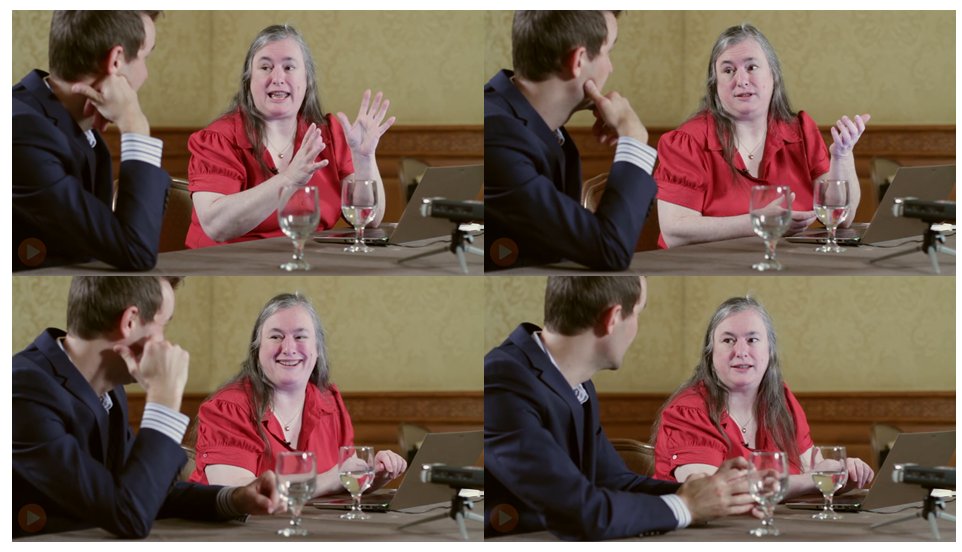
It came out to about 90 minutes overall so if you have a chance to watch it, let me know what you thought! Kate
 Sunday, 03 August 2014
How fun is this going to be? (A lot!)
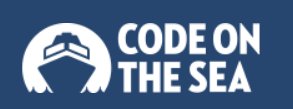
I'm going to speak at this next February! One of my big deciding factors was the other speakers. Erik Meijer, Greg Young, Michael Feathers, me, and one speaker still to be named. It's a small gathering to talk about software engineering. I'm still working on precisely what my two talks will cover, but expect it to include C++, legacy code, best practices, being "modern" in your C++, and related topics. Two days of intensive geekery wrapped around two days visiting the Bahamas! Space is still available so why not consider it? Brought to you by the Code on the Beach people, so you know they know how to do this. Kate
 Saturday, 02 August 2014
It's just around the corner - the largest C++ conference EVER with over one hundred talks! 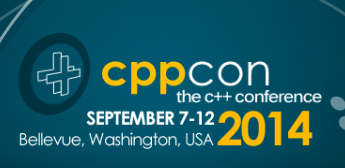
And two of those talks I'll be doing with James McNellis. We had such a good time presenting together for Microsoft Virtual Academy that we decided to do it again. How do these sound? Modernizing Legacy C++ Code
C++ is a programming language with a long, storied history spanning over three decades--four if one includes its C ancestry. The C++ language has undergone many changes during that time, compiler technology has advanced substantially, and computers today are very different from the computers of decades past. But despite all of these advances, there's an awful lot of C++ code in use today that looks like it was written in the 1980s. In some cases, the code was written in the 1980s and it's still in use; in other cases, it's recently-written code that just doesn't use modern style.
In this talk, we'll discuss some of the problems with legacy code, and review some practical techniques for applying principles of modern C++ to gradually improve the quality of legacy code and improve maintainability and debuggability. We'll show how some very small changes to code can yield huge benefits.
Making C++ Code Beautiful
Ask a non-C++ developer what they think of C++ and they'll give the language plenty of compliments: powerful, fast, flexible, and "the language for smart people". But along with that you are likely to hear ugly, complicated, hard to read, and "the language for smart people". Is it possible to write beautiful C++? Not arcanely elegant or wickedly compact, but readable, clear, expressive - beautiful! We say it is, and we want to show you how.
In this session, you'll see how to turn pages of "comic book characters swearing" into code you'll be proud to call your own. By making your code express your intent, using the power of new language and library functionality, and leaving hard-to-read constructs out of your vocabulary, you can give your code a makeover that will stand the test of time.
If you're not registered yet, there's still time! All five days cost $995 and there are one and two day passes available for less. You're going to want to meet and learn from the stars of C++ - check the full session list to read all about it. Kate
 Saturday, 14 June 2014
My latest Pluralsight course, Introduction to Visual Studio 2013 - Part 2 is live and ready for action. The modules are:
- Basic Debugging
- Additional Debugging Features
- IntelliTrace
- Working With Designers
- Extensions
If you haven't watched Part 1, you really should.
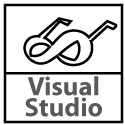
What's my next course? I'm trying to decide that at the moment and will let you know when it's underway.
Kate
 Friday, 23 May 2014
I've completed my development of my latest Pluralsight course and I'm just waiting for it to go live. Here are the "teaser" images I posted to Twitter and my public Facebook page as I was developing it:  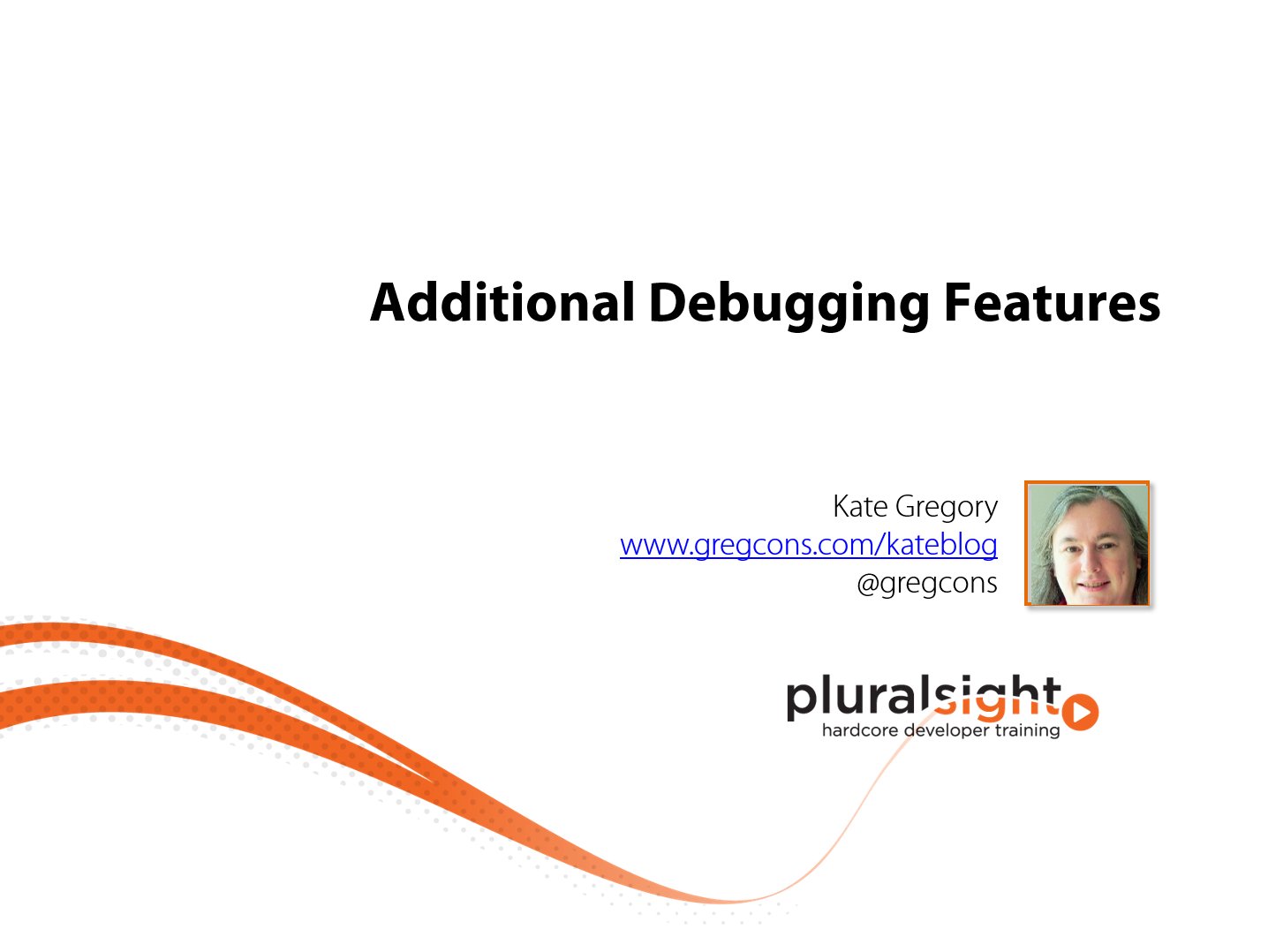 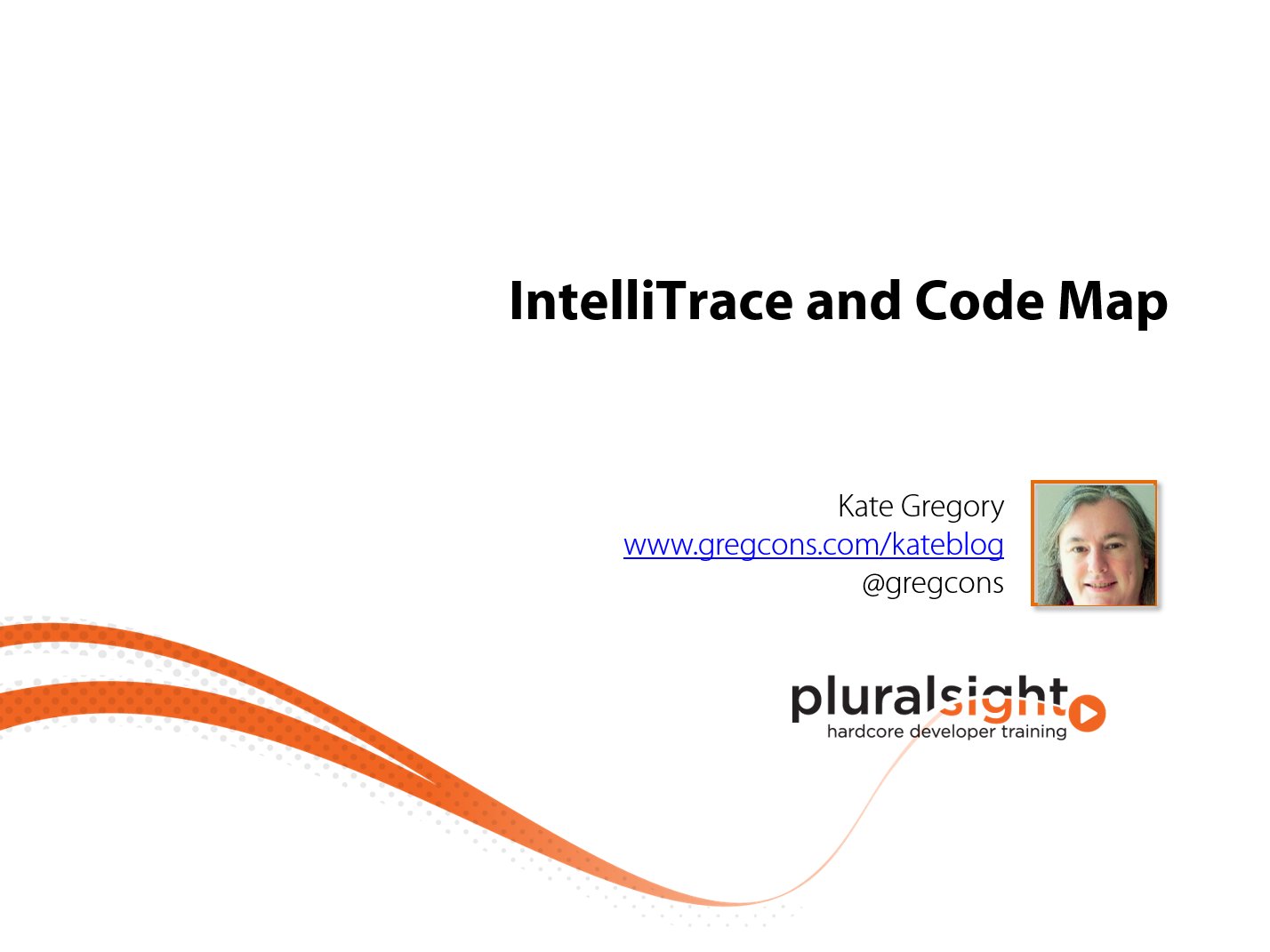 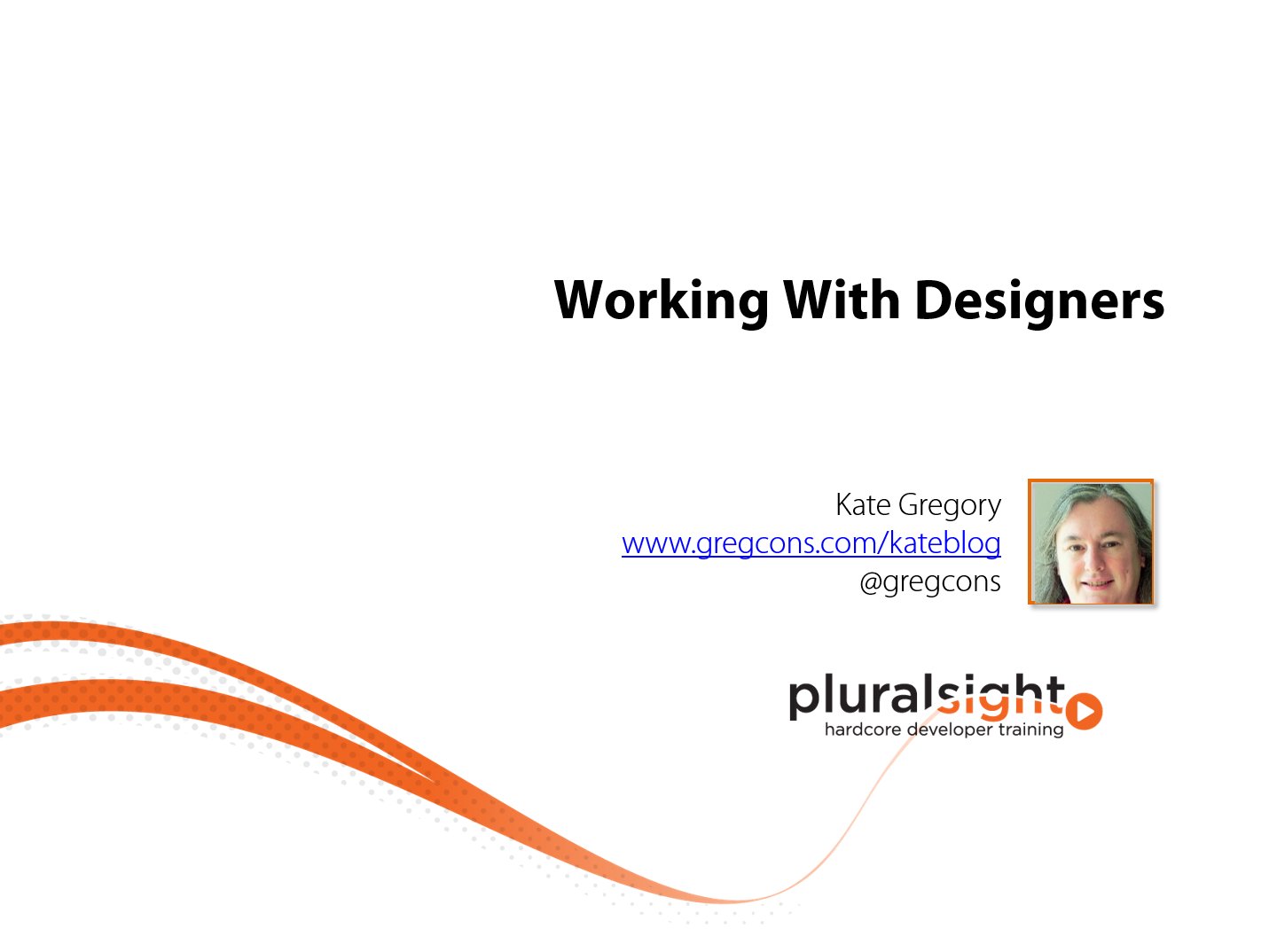 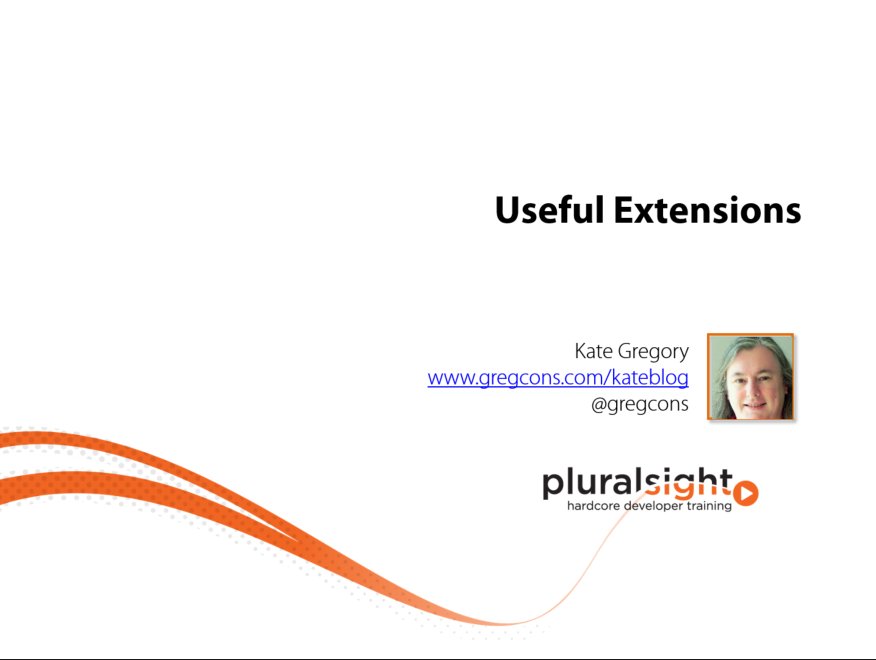
This was fun to put together and it's nice to get into things so many people don't know. I hope you take a look at it once it's live and learn from it!
Kate
 Wednesday, 30 April 2014
Do you think Agile and Enterprise can go together? Are you a senior .NET developer who is looking to lead? If so, a client of mine is looking for you. Their job description includes: We’ll look to you as a team leader who embraces a solid leadership capacity that has truly valuable impact on our team. In this senior role, you will participate in all aspects of the software development lifecycle including planning, technical design and architecture, construction, documentation, testing and deployment. Additionally, you’ll have a big picture view and the opportunity to play a role in the design.
and they're expecting: - Proven and deep experience with different versions of .NET Framework and C#/ASP.NET development
- Demonstrable experience working on N-tier architectures
- Solid understanding of the full development life-cycle
- Knowledge and experience with Agile development methodologies (e.g. XP, Scrum)
- Champion of agile engineering practices (e.g. TDD, continuous integration, refactoring etc)
- Good understanding of design patterns and their application
- Experienced unit testing frameworks
- Computer Science (or related) degree
- Knowledge of/experience with Sitecore is an asset
- Knowledge of/experience with Ektron is an asset
- Knowledge of/experience with Sharepoint is an asset
Sounds like you? Then get in touch with me and I'll make an introduction. Kate
 Monday, 17 March 2014
Office Lens went live in the Windows Phone Store today. I happened to have a list of things to do on a whiteboard in my office, so I gave it a try. I had already taken a picture of the whiteboard to transcribe but I went back to the board with the app installed to see if I could save some time.
Here's the picture Office Lens took (resized to 400 pixels wide) 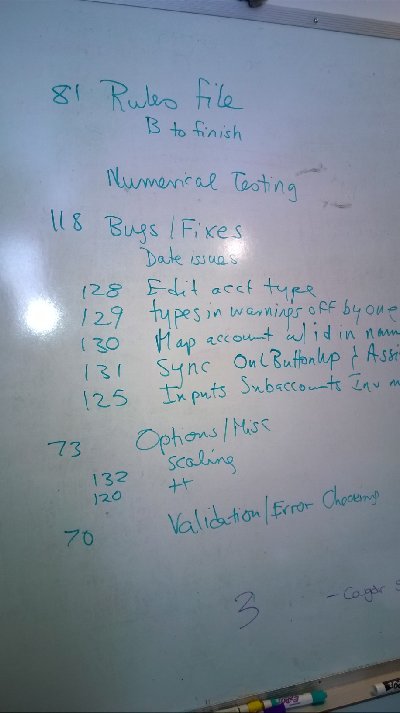
Here's how that looked when Office Lens cleaned it up and put it in a OneNote document for me (I copied the picture out of OneNote, cropped it and resized it): 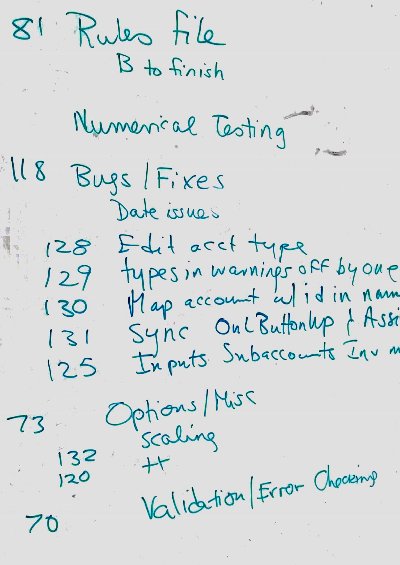
Much nicer - the glare spots are gone and the background is cleaner. The skew that resulted from taking the picture on an angle (a defensive action to keep the glare out of the important parts of the image) is also gone. As is, this can go into an email. If my handwriting was neater, One Note could have tried to extract the text from it. But this is a lovely improvement and Office Lens is free, so why not give it a try? Kate
© Copyright 2026 Kate Gregory
Theme design by Bryan Bell
newtelligence dasBlog 2.3.9074.18820   | Page rendered at Friday, 27 February 2026 12:08:20 (Eastern Standard Time, UTC-05:00)
|
On this page....
| | Sun | Mon | Tue | Wed | Thu | Fri | Sat |
|---|
| 31 | 1 | 2 | 3 | 4 | 5 | 6 | | 7 | 8 | 9 | 10 | 11 | 12 | 13 | | 14 | 15 | 16 | 17 | 18 | 19 | 20 | | 21 | 22 | 23 | 24 | 25 | 26 | 27 | | 28 | 29 | 30 | 1 | 2 | 3 | 4 | | 5 | 6 | 7 | 8 | 9 | 10 | 11 |
Pluralsight Free Trial
Search
Navigation
Categories
Blogroll
Sign In
|